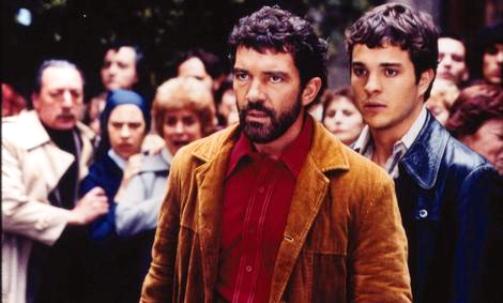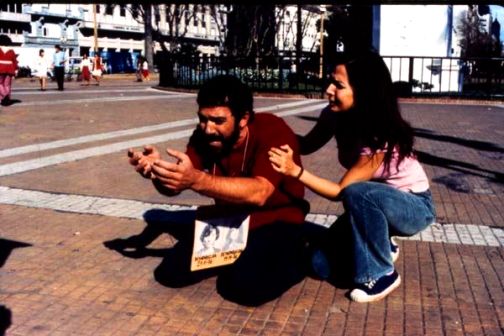Woke up to some warmth in the morning. It was warmer than had been over the past some days. But then it rained at places and the sky remained overcast.
There were friends of the younger son who had slept over and are still to break their slumber. They fell short of booze last night and borrowed vodka from my stash.
The elder one had a basket of emotions to handle, before his departure for Johannesburgh on Monday. We talked about us for sometime. Mother was with us. We slept well past midnight.
- Life is. The ” shoulds ” are for us to exert for. For sure, and now. The past is behind the moment; the future is potential in it… in the now. One by one, in the now, one ” should ” be applied at and on.
- The important thing is for us to be able to choose our thoughts. It’s a skill… God ! Yes, a skill, not a religion, that is acquired, like any other, with practice. Only, it is unusual for us to do; we are used to going downstream, after the thought is upon us and we are with it. Hence, to remain upstream, before the thought emerges, is truly uphill; and clearly, scarce. Most people I know do not have it. One, yes, a singular, who has, took a life time to acquire it.
We learn to choose to think during our schooling years. But thoughts are informal ” matter ” to the mind. They rush in to fill… anytime, all the time. They arise on the back of emotions rolling incessantly, of feelings sensed subconciously, whereof thoughts are automatically triggered. Then, the conscious faculty becomes aware of the thought, but not before being already taken up by the accompanying emotion – the subconscious and the subrational flare in our vitality.
We can choose our thought, even the informal ones, without the subrational emotion and its the vital surge. Yes, we can choose the thought … in the rational light of the intellect, in the full knowledge of the meaning it includes, known or unknown. In time, the thought in the mind will release its meaning and spill out in the form of emotion.
We can choose our thought… to examine it. Or, just to be happy !
If only we would.
- Anna Hazare is ill but reportedly better. Arvind Kejriwal has once again made an impassioned plea for true democracy, in which the will of the people is represented in the Parliament, not the machinations of the party high commands.
Our Prime Minister, Mr Manmohan Singh, ought to realise that people are no longer touched by promises and prophecies. They want it for real, here and now.
Pranab da must understand that in a country where the opposities are equally true, where the national language is actually ” foreign ” in large parts, regional aspirations are a measure of the good health of our nation, and not something of an inconvenience to be rued over.
Mr Chidambaram and Congress Party leader, Rashid Alvi, need to understand that nothing they say to the public is believable any more. They stand discredited and are regarded as untrustworthy.
As it is said, you cannot fool all the people all the time !
* * * * * *
Dec 02, 2012
- Three earthquakes… in Japan, New Zealand and Indonesia… greet the new year day ! Fortunately, no damages are reported.
- Dropped the elder one at the airport early morning. It was foggy, very severely in patches. Missed the turn to the terminal and had to u – back. Sadly, one can no longer give company in the lounges until boarding is announced. We, mother and myself, could wait just enough in the passageway, to see him wheel away the luggage towards the terminal entrance, before a stern voice on public address system order us to turn the wheels of our car.
Back at home, she discovers Montecristo cigars and Marlboro cigarettes in his drawer. The woman would normally be cool while I smoked anything. But this once, she brought the two packets to me and said with an indulging smile, ” Here, you could smoke these !” I noticed something soft in her look and accepted the gift with conspicuous joy.
- Madhu Koda, former Chief Minister of Jharkhand now in jail, grafted INR 35 billion, US$ 700 million approx. The Income Tax department has sent a notice for INR 12 billion towards tax and penalty. So, the swindler can keep the balance INR 23 billion of ill-gotten wealth ? !
- The Times Of India never fails to join the debate when people opine or suggest that there are dresses which are immodest, which show skin enough to drive perfectly normal men to drooling, some drooling men to coveting, and few coveting men to molesting and raping.
The daily states it loud : ” Nothing can justify rape or molestation.” We all will agree. But I also appreciate the immediately empirical facts about human behaviour : Immodest dresses prompt unacceptable behaviour among few men.
- There are two broad personality qualifications which prevent one from having the skill or power to choose one’s thought and disposition.
– One… lethargy, indolence and indifference; and
– Two… passion, desire and frenzy.
Also, the time of the day could matter ! It is common knowledge that the early hours between 4 a.m. and 6 a.m. facilitate the best.
- The Right To Food Bill is the next most important legislation on the table. But provisions in it are being opposed by the states. It may block its passage in the Parliament, as it happened with the Lokpal and Judicial Accountability bills.
- The Prime Minister has expressed the hope that media will do away with ” paid news “ on its own. Well, sir, what will compensate the media owners toward loss of revenue such news generate ? And, even before that, what is your own and your party’s crdibility in the matter, being the pioneer and past master at planting motivated and expedient news ?
- Sunil Gavaskar, the batting legend says, ” Alarm bells are ringing for India.” I am not sure. Do bells sound when there is no one to hear it ?
* * * * * *
Movie : Imagining Argentina – My Impressions
Antonio Banderas has a furrowed brow in the best of the times. In Imagining Argentina, a powerful and disturbing political drama, his look best serves the part of the passive but tortured head, Carlos, of a children’s theatre company in Buenos Aires in late 70s, when Argentina was under a repressive military dictatorship. The leading lady, Emma Thompson, comes across as authoritative, as his character’s journalist wife, Cecilia, with her tight demeanour, pursed lips and hard stare.
As is well known, I have no ability whatsoever of reviewing a movie that involves multiple technologies, abilities and skills. So I will borrow those from more knowledgeable reviewers while weaving my appreciation of the art, the story and style, and what it meant to me.
This is a riveting film but not of the ” popcorn ” kind. It is a labour of love. Imagining Argentina is about the best and the worst within us, narrated with passion. It does present suspense, devotion and romance, but also a few probing insights into human nature that give credit to its makers. Considering how the information and advertising space is occupied, whether in print or as broadcast on air and the web, it is not surprising that the movie has received little publicity.
I found the narrative beautiful; it kept me on the edge of my seat. The acting is just right to convey the storyof how more than 30,000 people – families, husbands, wives, sons and daughters – disappeared during those years between 1976 and 1983, when the dreaded regime was overthrown. The director, Christopher Hampton adapts the storyline from a prize-winning novel, takes poetic license weave the desperate, helpless and unhappy conditions under which an entire population lived. He imagines, with some realism and a lot of daring. The rather passive protoganist, Carlos, suddenly discovers the ability to see everywhere… all those places of rape, torture and execution, where people and children snatched from their homes were illegally held for weeks and months, if not shot. Carlos could hold the hand of a boy, whose father has disappeared, and divine the parent’s fate. He set up a tent of sorts, drawing the multitudes… heartsick relatives – sad, anxious and weeping – just wanting to know what’s become of their loved ones. Carlos says it, like he sees it, even when he sees their death. That is his single means to rebel, defy, and oppose the all – powerful military dictators and their fascist enterprise.
Hampton, an Oscar winner for his Dangerous Liaisons screenplay, is far more skilled with words than visuals. The conversations between Carlos and Cecilia are smart, allowing Banderas and Thompson to sparkle. It speaks of a conversation they had before they were married, which Cecilia recalls to remind him of a detail he’d forgotten. She tells him, she was explaining to him her desire to be a journalist and asking difficult questions from everybody involved, especially the powers that were. She says, “You said, ‘Ask me a difficult question.’ ” And, she reminds him, she had responded, ” ‘Will you marry me ?’.” The effect, of how she had proposed to him, was magical… to both Carlos, in the movie, and the audience that included me !
Hampton could have been more creative in portraying Carlos’ visions, to distinguish them from scenes carried the story forward. His imaginings are portrayed in the colour and style, not in black and while or grainy, which make it difficult to separate that which was in his visions from the mainstream reality which the director captures in the film. The doubt lingers : Is Carlos on the level or is he a charlatan ? Or, is he gone mad with his personal grief, the loss of his wife and daughter ? On the other hand, the technique offers to the audience the opportunity to regard Carlos’ visions as real, as events truly happened then. An opportunity that I availed.
Carlos can’t see Cecilia as clearly as the strangers he’s asked about by others. On an elusive search to rescue her, he journeys to the countryside, hither and thither, and chances upon an elderly couple, memorably played by Claire Bloom and John Wood, who survived a Nazi concentration camp. It’s from them that he learns how to live with a reality that oppresses, denies, denudes, enslaves, restricts, tortures, rapes and kills. ” Imagine an alternate reality… ” the couple suggest, one that will pervade the mind and suffuse the heart, raise the spirit and strengthen, in contrast to the reality in our sight and experience. Thornton’s work does that in Imagining Argentina, in Carlos’ clairevoyance which becomes a metaphor for rebellion that wins over the neat hordes of subhuman spirit.
In another marvelous conversation, Claire Bloom’s character explains why they keep so many birds on their estate. Hampton neatly ties this in with an ending that’s fills the despairing heart with hope. It’s wonderful, to say the least.
Imagining Argentina adds a postscript listing the number of people who have “disappeared” around the world, including 90,000 in Iraq. It brings the reality of the subject matter closer to us. Despite its several flaws that critics point out, the human – interest film does a fine job of highlighting a major cause of misery that we serve to ourselves. It helps us imagine what it is like to loose our loved ones on account of unbridled drive for power that humans have, and its unchecked misuse that snatch our relatives and friends away from us, you and I who are left behind… feeling and living the dark misery over and over again, in vain.
The movie suggests… if you are living a pervasive nightmare, there is no alternative but to re – imagine it ! For life – giving empathy and positive memory are powerful personal means and long – reaching political instruments in themselves.
* * * * * *
Argentina’s Dirty War and the regime of Generals from 1976 to 1983 is one of the darkest secrets of history. It has been examined by poets and journalists, by writers such as Colm Toibin and Lawrence Thornton. And yet the silence about this period is deafening, especially since the amnesty which released the perpetrators from all responsibility of that terrible time and their terrifying deeds.
Imagining Argentina is a red flag bravely waving.

In 1976 the intellectuals – professors, journalists and writers – began disappearing… kidnapped and taken to secret hideaways, tortured, raped, and disposed off… all in the cause of protecting the viability of the military regime led by General Videla that projects the ruse of communist avalanche it has sworn to battle against and protect the people from. But fascism and communism are close cousins and, as Argentina’s history of the period shows, it is easy to trip over to the fascist position through battling the communist scourge.
This episode of Argentine history should be remembered as part of human evolution tale.








